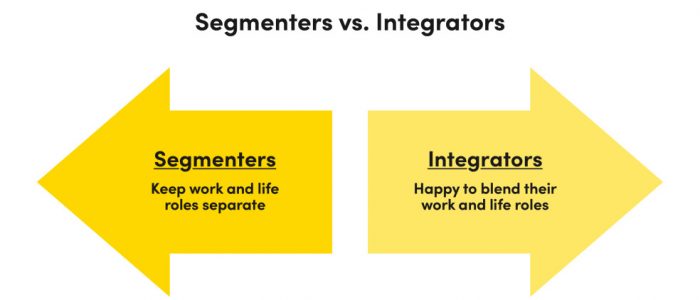Be Aware of Differences in How People React to Working from Home
The modern world of work is blurring the lines between work and home, a development which speeded up with the Covid19 pandemic. As negotiators, we need to be sensitive to how our clients – and our own team – deal with the blurring. Modern research shows that people react in very different ways. Wharton Management professor Nancy Rothbard has spent years studying the work-life mix. She classifies people into two categories – integrators and segmentors. “Integrators have a very strong desire to integrate professional and personal life,” she explains. Segmentors, on the other hand, keep work and life exclusive. For segmentors, work-life and non-work-life are, according to Rothbard, “separate spaces which they cannot cross, and if they did, it would be very inappropriate and/or distracting.” (For a good introduction to her work, see Are your employees integrators or segmentors?).
If negotiating with a segmentor, realize that they may resent intrusions into their personal space. They may not want to talk about personal time at work, and they may not like getting calls when at home. Integrators, on the other hand, can’t really leave work even when they leave work. They have an urge to constantly check their smart devices for work updates and be connected. They may be unhappy if a message is not responded to immediately.
Those are two extremes; most of us combine aspects of segmenting and integrating. There are usually spill-overs We are all social beings, and make personal connections at work as well. Some of colleagues will be friends, for instance. But a good negotiator needs to be aware of just how differently people can react to the work/life interaction.
Rothbard explains the special challenge the COVID-19 pandemic presents for segmentors. “In this new reality we’re living in, it’s particularly challenging for segmentors, people who like to keep a sharp line between work and home. We can’t do that right now, even if we want to. This is where the rubber hits the road, and our two worlds are colliding like crazy,” Rothbard says (see her May interview with the Wharton Business Daily radio show on SiriusXM, Rothbard (Working from Home: Navigating the Pandemic’s New Normal).
She offers some personal advice for segmentors: “For people who are segmentors, there’s a lot of work they need to actively do to be more comfortable in this type of environment. And that involves doing two things: really thinking about how to use your time and thinking about how to structure your space. From a time perspective, a segmentor is going to be much better off if they stick to a routine or a schedule. They have a ritual where they transition into their work mode. But a lot of people who are not as comfortable with that shouldn’t be setting up in the middle of the kitchen. The second piece is the space piece of it. They should have a room that’s off to the side where they can close the door, they can lock it, and they can preserve the sanctity of their space.”
She also offers important advice for negotiators who have to deal with segmentors: “If they’re on a team and they need to coordinate with other people to get their work done, it’s really, really important to have that person available during a window that is also acceptable to the other people on the team,” she said. Her recommendation: structure a shared time.

